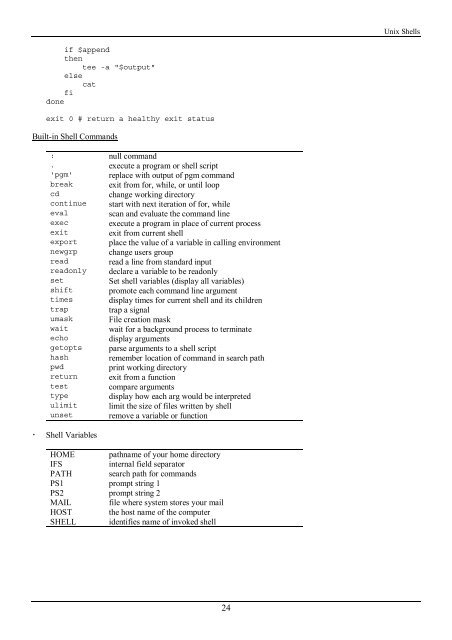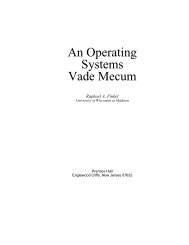Create successful ePaper yourself
Turn your PDF publications into a flip-book with our unique Google optimized e-Paper software.
<strong>Unix</strong> Shells<br />
if $append<br />
<strong>the</strong>n<br />
tee -a "$output"<br />
else<br />
cat<br />
fi<br />
done<br />
exit 0 # return a healthy exit status<br />
Built-in Shell Commands<br />
: null command<br />
. execute a program or shell script<br />
'pgm' replace <strong>with</strong> output of pgm command<br />
break exit from for, while, or until loop<br />
cd<br />
change working directory<br />
continue start <strong>with</strong> next iteration of for, while<br />
eval scan and evaluate <strong>the</strong> command line<br />
exec execute a program in place of current process<br />
exit exit from current shell<br />
export place <strong>the</strong> value of a variable in calling environment<br />
newgrp change users group<br />
read read a line from standard input<br />
readonly declare a variable to be readonly<br />
set<br />
Set shell variables (display all variables)<br />
shift promote each command line argument<br />
times display times for current shell and its children<br />
trap trap a signal<br />
umask File creation mask<br />
wait wait for a background process to terminate<br />
echo display arguments<br />
getopts parse arguments to a shell script<br />
hash remember location of command in search path<br />
pwd<br />
print working directory<br />
return exit from a function<br />
test compare arguments<br />
type display how each arg would be interpreted<br />
ulimit limit <strong>the</strong> size of files written by shell<br />
unset remove a variable or function<br />
! Shell Variables<br />
HOME pathname of your home directory<br />
IFS<br />
internal field separator<br />
PATH search path for commands<br />
PS1 prompt string 1<br />
PS2 prompt string 2<br />
MAIL file where system stores your mail<br />
H<strong>OS</strong>T <strong>the</strong> host name of <strong>the</strong> computer<br />
SHELL identifies name of invoked shell<br />
24
















